Dates For Diabetes: 5 Key Benefits And How To Use Them
The right amount of dates can keep your blood sugar levels and pounds in check.

Image: ShutterStock
People with diabetes have to look far and wide for sugar substitutes. Many prefer using dates for diabetes. But is it a safe option? We will find out here.
The date fruit is among the widely preferred fruits for those watching their sugar levels can eat in moderation.
Dates are sweet, have a low glycemic index, and are one of the healthiest foods. In addition, several studies concluded that dates do not spike blood glucose levels.
They are packed with a variety of vital nutrients and are extremely healthy. Apart from fructose, they also contain rich dietary fiber and nutrients such as iron, calcium, magnesium, zinc, and vitamin A, K, and B-complex. Nutrients such as vitamin A may promote eye health and help prevent diabetic retinopathy. These nutrients may also alleviate constipation, heart disease, and diarrhea, along with diabetic complications, such as diabetic nephropathy, diabetic ketoacidosis, diabetic gastroparesis, and diabetic coma.
This article discusses the benefits of dates, how to use them, and their risks. Take a look.
 Know Your Ingredient: Date fruit
Know Your Ingredient: Date fruitWhat Is It?
A tropical sweet fruit with a rich nutritional profile that grows on date palm trees.
What Are Its Benefits?
Improves insulin sensitivity, protects against oxidative stress, and helps regulate blood sugar levels.
Who Can Consume It?
Suitable for everyone.
How Often?
2-3 pieces every day.
Caution
People who have nut allergies may also negatively react to it. Diabetic people should consume it in moderation.
In This Article
Dates – An Overview

Dates are one of the most commonly eaten foods in the Middle East. The benefits of dates are plenty and well-known to people across the globe, especially due to their amazing nutritional qualities. Because of the long shelf life and rich nutritional profile of its fruits, the date palm is also called “The Tree of Life” (1).

Apart from containing a high amount of fructose, they also contain an opulence of fiber and nutrients like vitamins A, K, and B-complex, iron, calcium, sodium, potassium, magnesium, and zinc. The presence of these nutrients in dates helps prevent constipation, heart diseases, anemia, and diarrhea, among other conditions (2). Due to their high fructose/fructan content, they may be problematic for IBS.
All well. But what about diabetes? What’s the connection between dates and diabetes?
Dates For Diabetes – What Does Science Say?
Numerous studies have been done to determine the GI of dates and their effect on people with diabetes.
A study done in 2011, published in the Nutrition Journal, was carried out to find the glycemic indices of five varieties of dates. It showed that when diabetics consumed dates, their postprandial glucose levels did not skyrocket. It also showed that dates could offer potential benefits for diabetic patients when consumed in moderation along with a healthy balanced diet (3).
Another study done in 2003 tested the glycemic index of a single variety of dates, alone and mixed with plain yogurt. It showed that, in both forms – when consumed as is and when mixed with yogurt – the GI of Khalas dates is low, and it could be of benefit to diabetic patients (4).
A similar study was done in 2002 to determine the glycemic indices of three commercially available varieties of dates. It concluded that even though there were significant differences in the glycemic indices of different types of dates, the fact remained that consuming any of those varieties was beneficial in the glycemic and lipid control in diabetics (5).
 Trivia
TriviaSo, can patients with diabetes eat dates? Let’s find out.
Can Diabetics Eat Dates?
Are dates good for diabetes? Well, the studies mentioned above prove that when diabetics eat dates, their blood sugars do not spike, contrary to the common notion. It is safe to say that consuming dates provides a person with a wide range of health benefits.
A study was conducted to determine the prevalence of diagnosed type 1 and type 2 diabetes among 58,186 US adults in 2016-2017. 6317 out of the total cohort had received a diagnosis of diabetes. The prevalence of diabetes was 9.7%, wherein type 1 diabetes was 0.5%, and type 2 diabetes was 8.5%. Among US adults, type 1 diabetes accounted for 5.6% and type 2 diabetes for 91.2%.
Sugar In Dates For Diabetics: Most people consider dates as an ideal food. And why wouldn’t they? Dates are a whole food, have no cholesterol, very little fat, and a wide range of nutrients that benefit our body. But apart from these amazing qualities, dates contain a good amount of sugar. One cup of dates contains about 31 grams of fructose (6).
Dates contain 80 percent sugar (by weight). This quantity is a lot higher than other foods like sugary cereal or jelly beans. However, the sugar content in the dates does not have any detrimental effects on the blood sugar levels of patients. To prove this statement, some scientists from Israel tested a group of people by making them consume a good amount of dates for one month. At the end of the month, the weight and blood sugar levels of their subjects were stable, and they also showed considerable improvements in their triglycerides and antioxidant levels (7).
Medjool Dates And Diabetes

Medjool dates, more popularly known as the “King of Dates,” are considered as one of the most exquisite varieties of dates. They are known especially for their softness, big size, and sweet flavor.
A study was done on the effect of Medjool dates on 10 healthy subjects, who were made to consume 100 grams of Medjool dates for 4 weeks. At the end of 4 weeks, the results showed that there was no significant change in the blood glucose levels during the glucose monitoring of the subjects. There were also no major changes in their cholesterol levels and BMI values.
This goes to show that consuming dates does not cause a change in the sugar levels of people, making Medjool dates safe for diabetics, prediabetes, and gestational diabetes.
Ajwa Dates And Diabetes

Ajwa is a variety of dates harvested in Saudi Arabia that has excellent disease-curing properties. In Islam, there is a quote by Saud, a Messenger, who said, “If somebody takes seven Ajwa dates in the morning, neither magic nor poison will hurt him that day.”
Coming to diabetes, a 2011 study performed on diabetic rats proved that consuming Ajwa dates helped improve diabetic neuropathy and potentially prevented diabetes-related complications.
By the way, do dates have any health benefits for diabetics? What are they?
What Are The Health Benefits Of Dates For Diabetics?
- They Possess Low And Healthy GI
The higher the Glycemic Index of foods, the higher is the risk of your sugar levels increasing in the bloodstream. This is why diabetic patients are told to consume foods that are lower on the GI scale. It is due to this reason that dates are recommended for diabetics since they have a very healthy GI. Studies have shown that different varieties of dates have different glycemic indices, widely ranging from 35 to 55.
- Dates Contain Glucose And Fructose
In its early stages of maturation, the date fruit contains a high amount of sucrose. As the fruit matures further, the sucrose gets broken down into glucose and fructose.
Glucose and fructose are the simplest forms of sugars present in our bodies that provide instant energy. Thus, if a diabetic patient eats a couple of dates during the day or while working out, she gets an immediate boost of energy and stamina. Due to this reason, dates are widely used across the globe to break the fast during the holy month of Ramadan.
- Fat-Free, Nutritious, And Sweet Fruits
Dates are excellent sources of nutrition. They are very low in fat, have no cholesterol, and contain a plethora of essential nutrients like vitamin B-complex, vitamin A, iron, calcium, copper, sodium, potassium, and magnesium.
Another important element found in dates is selenium, which has shown to improve immune function and prevent cancer (8), (9).
It is because of all these amazing properties that dates are said to have the potential to be one of the best foods for the future.
- Dates Contain Dietary Fiber
Apart from having high amounts of energy and carbohydrates, dates are also extremely rich in dietary fiber, about 6.4 to 11.5% of the total fruit (10). Most of the fiber present in dates is in an insoluble form, which adds roughage to the digestive system. This helps to lower your cholesterol, keep your blood sugar in control, and aid weight loss (11). A study showed that about 100 grams of dates contain roughly 8 grams of fiber (12). Studies show how they can even help prevent colorectal cancer without inducing changes in the microbiota (13).
- Dates Have Antioxidant Properties
Dates are high in antioxidants, which help fight against oxidative stress, a serious condition that occurs when the body’s antioxidants and free radicals are not in balance (14). Oxidative stress is especially concerning for people with diabetes because it can lead to the development of several diseases linked with diabetes, including neuropathy (damage to the nerves) and retinopathy (damage to the eyes) (15).
But what about the consumption? What ways can we consume dates in?
Various Ways Of Consuming Dates

You don’t just have to eat a date as is (although that is one of the best ways to enjoy it) – there are so many creative ways to incorporate these little superfoods into your daily diet. Some of the most common ways of consuming dates are listed below:
- Transform your date into a power-packed snack by removing its seed and replacing it with a nut of your choice. Whether you stuff it with an almond, walnut, pistachio, or a bite-sized chocolate, the result will be delicious.
- You can blend dates into a smoothie or a milkshake and carry it with you as a snack on-the-go.
- Grind some dates to make a paste and use it as a topping for pancakes or waffles or add it to your breakfast cereal.
- A very popular Middle Eastern desert, Maamoul, is made by filling date pudding inside cookies.
- Chop some dates into small pieces and add them to salads.
- Serve diced dates over some desserts like ice creams or frozen yogurt.
- Make a homemade trail-mix by mixing almonds, cashew nuts, pistachios, raisins, and dates.
 Quick Tip
Quick TipWhile there are many different ways to include dates in your diet, portion control is important. Learn more about it in the next section.
Key Takeaways
- Dates don’t cause blood sugar levels to rise due to their low glycemic index rating.
- You can add dates to your diet by eating them raw, or including them in smoothies, salads, and baked dishes.
- Dates are a perfect choice for people with diabetes as they are full of essential nutrients, and dietary fiber.
- However, people with diabetes should consume them in moderation; not more than 3 dates per day or as suggested by the doctor.
How Many Dates Can A Diabetic Eat In A Day
Since careful attention to one’s diet is required to manage diabetes, the number of dates a diabetic can consume in a day depends on various factors. Generally, it is advisable to consume no more than 2-3 dates a day as they have a high natural sugar content. However, individual tolerance may vary so it is advisable to check with a healthcare provider to understand how much you can eat every day (14). It is essential for diabetics to closely monitor their blood sugar levels after high sugar intake to gauge their body’s response.
Coming to the most important question – what effect do dates have on hypoglycemia, hyperglycemia or blood sugar levels in general?
Effect Of Dates On Blood Sugar Levels
A study was done in 2009 to test the effect of two varieties (Medjool and Hallawi) of dates on blood glucose levels. Ten people were made to consume 100 grams of either of these dates per day. After 4 weeks, the studies showed that none of their blood sugars or triglycerides increased. The study concluded that regular consumption of dates does not affect the blood glucose levels of healthy people, despite their high sugar content in dates (15).
So, is it safe to say that diabetics can eat dates as well, without worrying about jeopardizing their blood sugar levels? I think it is. But, all diabetics should check their blood sugar levels and understand their individual response to certain foods. You should also keep your diabetic supplies with you including insulin injections, insulin pumps, along with other medications for diabetic wound care in case of conditions such as diabetic foot ulcers for which diabetic foot care is required. This is important. Though there is not much research found on the recommended daily intake of dates, most physicians advise their diabetes patients to eat not more than 3 dates per day.
Infographic: Are Dates Beneficial For Those With Diabetes?
The low glycemic index of dates makes them a great choice for people with diabetes. They are less likely to spike blood sugar levels. The dietary fiber in dates also helps improve this condition. Dates are available in many different forms. Click on the infographic below to learn more about the role of dates in regulating blood sugar levels in case of type 2 diabetes (causing insulin resistance) and how to use them.
Some thing wrong with infographic shortcode. please verify shortcode syntaxDates are nutrient-dense and sweet tropical fruits. They are high in vitamins A, K, and B, as well as fructose and dietary fiber. Dates have a low GI, and they do not spike blood sugar levels as much. They could be safe to include in a diabetic diet if their intake is regulated. They may even boost energy levels and stamina. Although dates contain a lot of sugar, regular consumption does not seem to affect blood sugar levels in healthy individuals. Hence, those with diabetes may consume dates in moderation (up to three per day). Consult your doctor for more information in this regard.
Frequently Asked Questions
How many dates can a diabetic eat?
Not more than 3 dates per day
Is date syrup good for diabetics?
Only in moderation. It is better to eat whole dates than having date syrup.
Do dates increase blood sugar?
No, they do not have a significant impact on blood sugar levels. But, as discussed already, the effect of dates on a person’s blood sugar levels depends on their specific condition. It is always best to consult a doctor or seek the help of diabetic support groups to broaden your diabetic education.
What is the best time to eat dates?
Dates have a high fiber content which makes it ideal for consuming them in the morning to make you feel full for a long time.
Can dates increase blood pressure?
No, there is currently no evidence in case of either type 2 or type 1 diabetes that suggests that dates can increase blood pressure. However, studies suggest that dates can help regulate blood pressure levels (16).
Can we eat dates on an empty stomach?
Yes, you can eat dates on an empty stomach right in the morning before a workout to give you a boost of energy to fuel your workout (12).
Should dates be refrigerated?
Yes, dates can be refrigerated in an airtight container for 6 months to keep them fresh.
Illustration: Dates For Diabetes: Are They Safe? How They Affect Sugar Levels
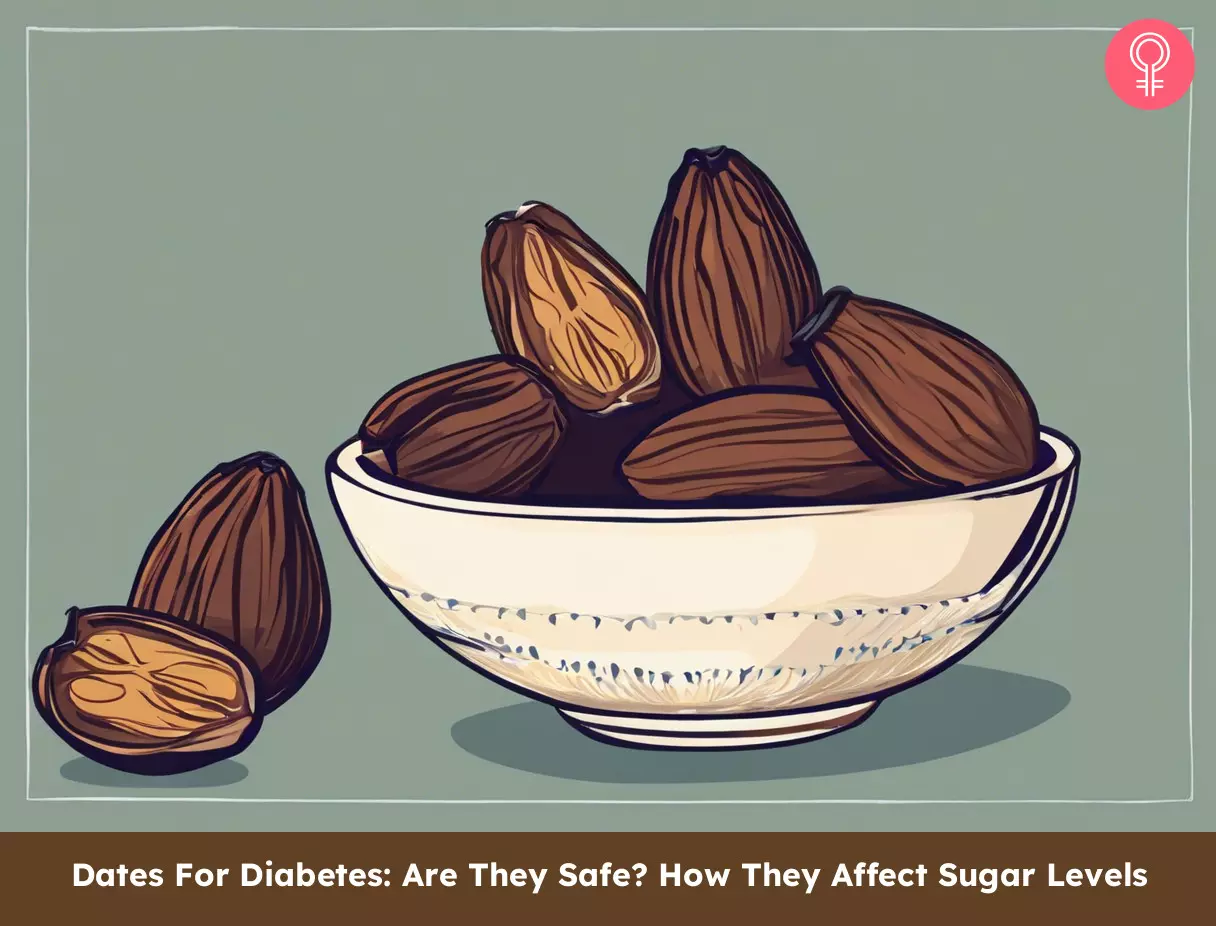
Image: Stable Diffusion/StyleCraze Design Team
Do let us know if you found this post useful by commenting in the box below.
Dates are a wonderful alternative for those looking to lower their sugar intake. Find out how dates can help with diabetes in the video below. Learn the facts and ideal ways of consuming it. Check it out now!
References
Articles on StyleCraze are backed by verified information from peer-reviewed and academic research papers, reputed organizations, research institutions, and medical associations to ensure accuracy and relevance. Read our editorial policy to learn more.
- “Nutritional Analysis of Date Fruits in Perspective of Bangladesh”. American Journal of Life Sciences. 2015.
- “A-Z of healthy ingredients: what are dates and how can I eat them?” The Evening Standard. Grace McCloud. April 2015.
- “Glycemic Indices of Five Varieties of Dates in Healthy and Diabetic Subjects”. Abu Dhabi Food Control Authority. May 2011.
- “Glycemic Index of Dates and Date/Yogurt Mixed Meals”. United Arab Emirates University. March 2003.
- “The Glycemic Index of Three Varieties of Dates”. United Arab Emirates University. May 2002.
- “Dates, medjool”. FoodData Central, USDA.
- “Dates protect against heart disease”. Israel21c. October 2009.
- “The fruit of the date palm”. London Metropolitan University. July 2003.
- “Why dates”. Weill Cornell Medicine-Qatar.
- “The Impact of Date Palm Fruits and Their Component Polyphenols, On Gut Microbial Ecology, Bacterial Metabolites and Colon Cancer Cell Proliferation”. University of Reading, UK. Oct 2014.
- “Dietary fibre and whole grains…“. US National Library of Medicine, March 2025
- “Nutritional and Functional Properties of Dates : A Review.” Cornell University, Geneva, New York. Nov 2008.
- “Impact of palm date consumption on microbiota…”. University of Reading, UK. October 2015.
- Date Palm (Phoenix dactylifera L.) Fruit as Potential Antioxidant and Antimicrobial Agents”, US National Library of Medicine.
- “Oxidative Stress in Type 2 Diabetes: Impacts from Pathogenesis to Lifestyle Modifications”, US National Library of Medicine.
- “Dates fruits effects on blood glucose…” Pakistan Journal of Medical Sciences. Jul-Aug 2025.
- “Effects of Date Consumption by Healthy Subjects on Serum Glucose and Lipid Levels and on Serum Oxidative Status : A Pilot Study.” Technion-Israel Institute of Technology, Israel. September 2009.
- “Date Palm Fruit (Phoenix dactylifera): Effects on…” US National Library of Medicine, 2025
Read full bio of Kathie Madonna Swift
Read full bio of Ravi Teja Tadimalla
Read full bio of Arshiya Syeda
Read full bio of Sindhu Koganti









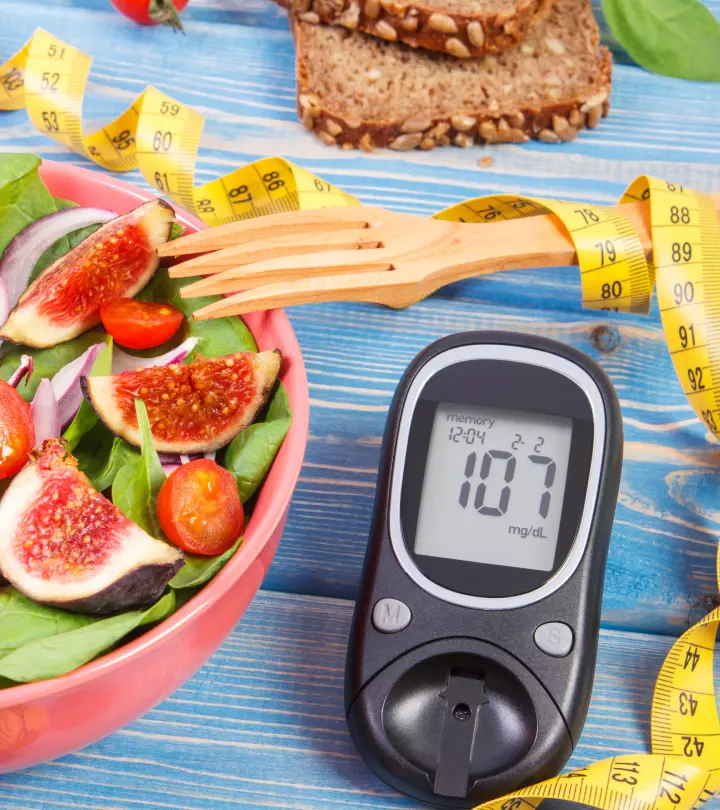
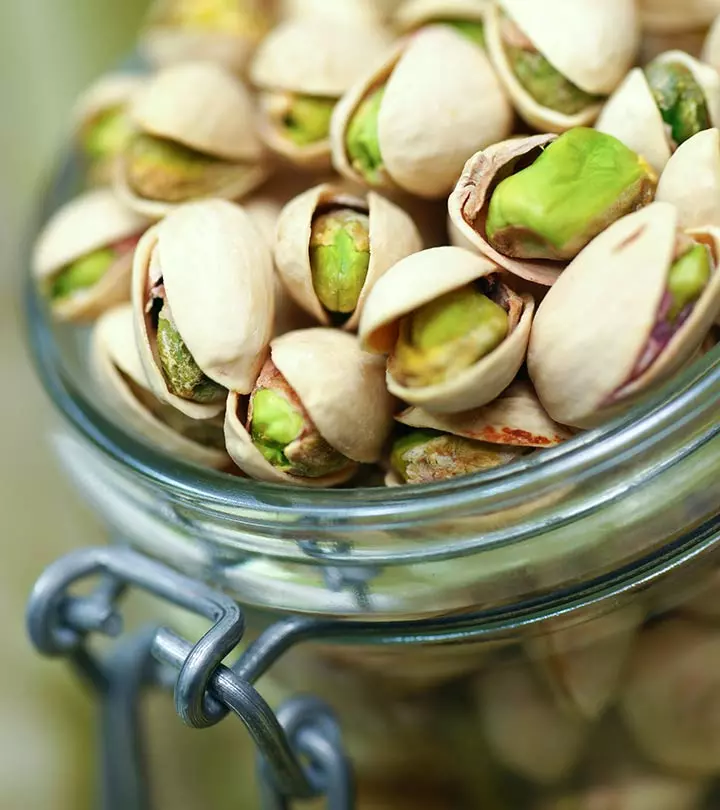

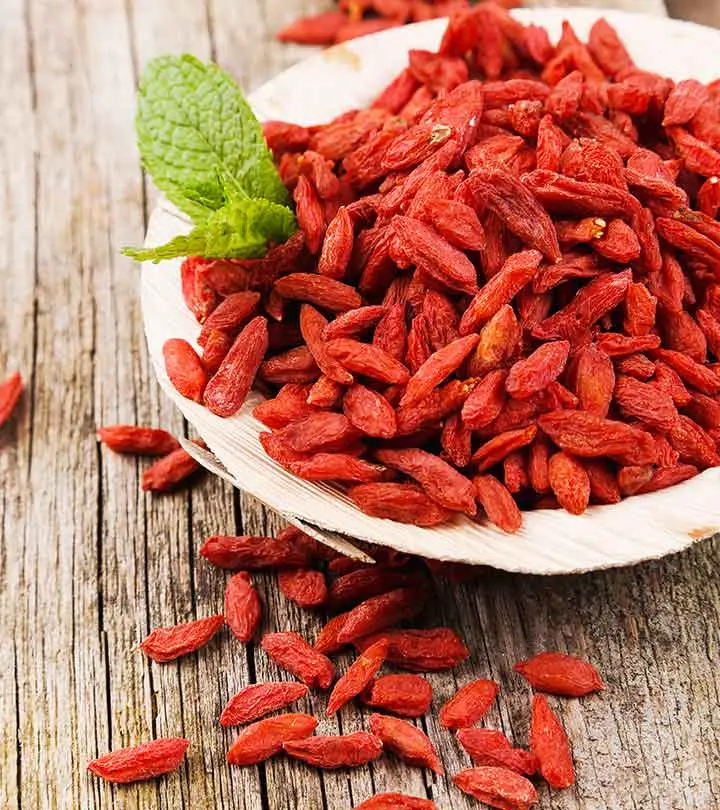
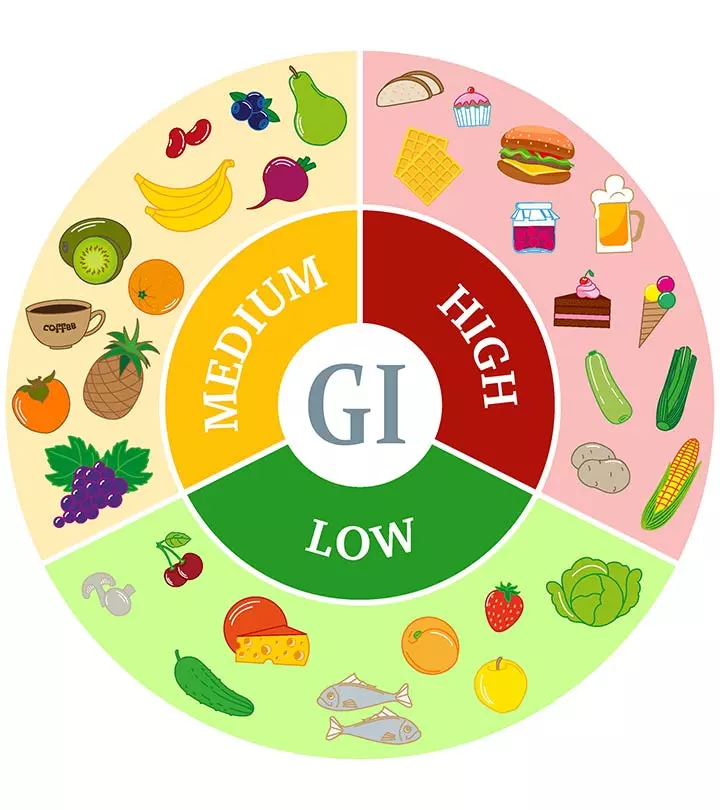



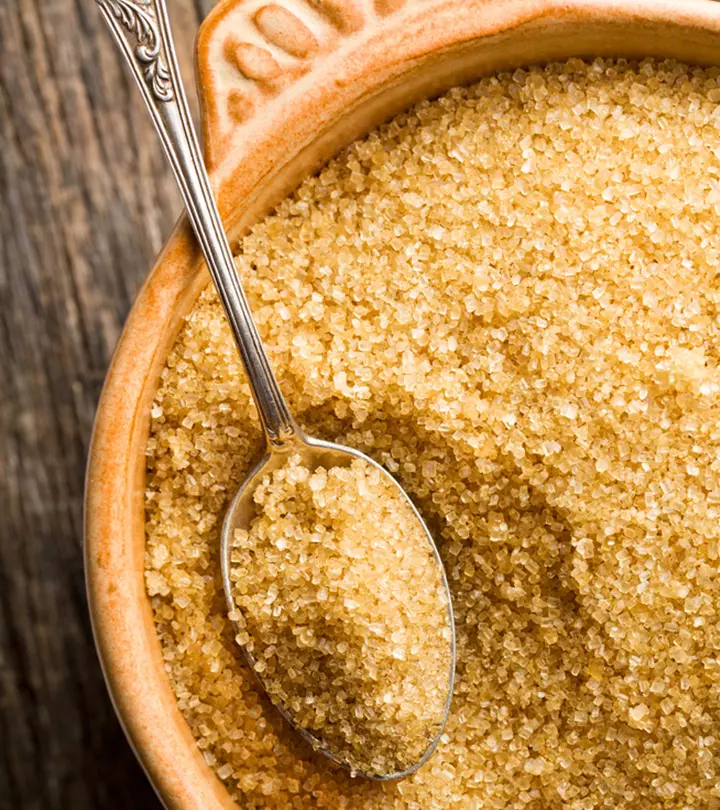


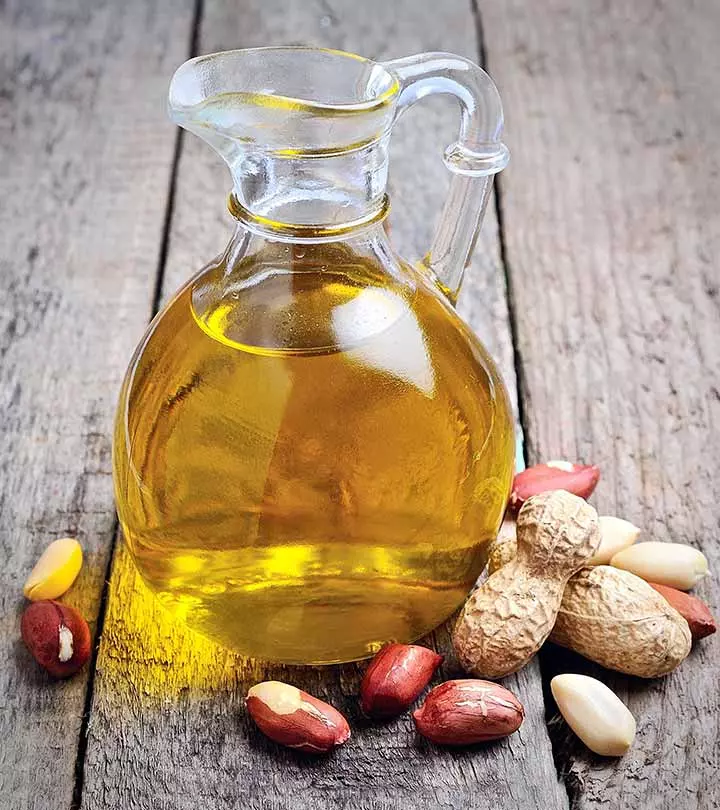





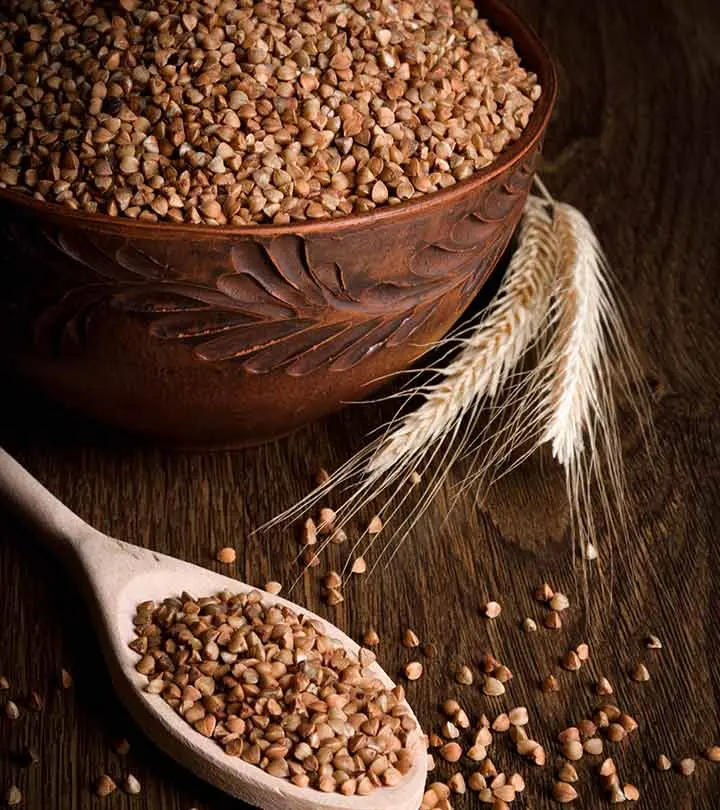
Community Experiences
Join the conversation and become a part of our empowering community! Share your stories, experiences, and insights to connect with other beauty, lifestyle, and health enthusiasts.